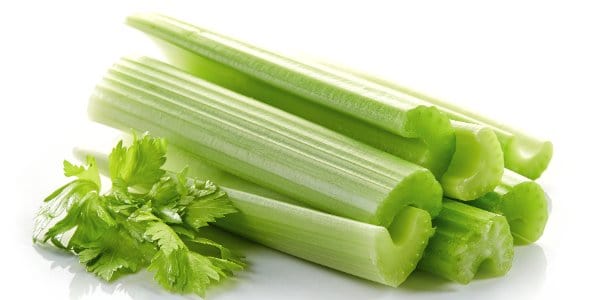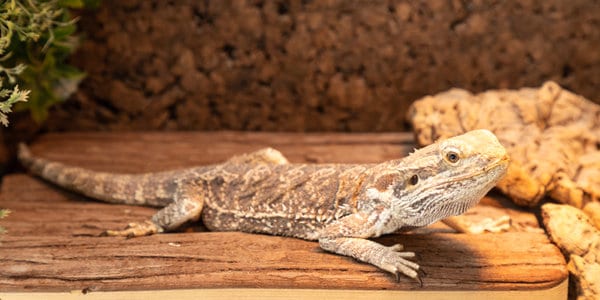Celery is healthy and tasty food for human beings. It is quite versatile and makes a great addition to crunchy snacks, soups, and salads. But is it as ideal for bearded dragons as it is for humans?
Bearded dragons feed on an omnivorous diet. A significant part of their animal-foods diet comes from insects, while the plant-based ones come from vegetables, plants, and a few fruits.
If you are an amateur bearded dragon owner, you are bound to wonder; does celery make a good vegetable choice for bearded dragons?
Can bearded dragons eat celery?
Yes, it is safe for bearded dragons to eat celery. Both the leaves and stalks are suitable for the lizard as a part of the plant portion of their diet. However, you should give it sparingly, and you should also be careful in how you prepare it.
This crunchy green vegetable is suitable for your pet from time to time. However, it is not the most nutritious greens you can choose for your bearded dragon. As such, it should not be a staple part of the diet but an occasional treat from time to time.
Nutritional Value of Celery
Below are the major nutrients, minerals, and vitamins in celery.
| Nutrient | Amount per 100 g of celery |
| Protein | 0.69 g |
| Fat (Total Lipid) | 0.17 g |
| Fiber | 1.6 g |
| Sugars | 1.34 g |
| Carbohydrates | 2.97 g |
| Water | 79.53 g |
| Calcium | 40 mg |
| Sodium | 80 mg |
| Iron | 0.2 mg |
| Vitamin B6 | 0.07 mg |
| Phosphorus | 24 mg |
| Vitamin C | 3.1 mg |
Now that we know the nutritional value of celery, let us now look at the benefits and disadvantages of this celery composition.

Benefits of Celery to Bearded Dragons
Celery has several benefits for your bearded dragon, which is why you should consider including it in the lizard’s diet. Let’s have an in-depth look at the significant advantages of doing so.
1. Low In Sugar
Celery is low in sugar which makes it good for your pet. Bearded dragons risk suffering from challenges such as teeth problems, stomach pains, and obesity should they take too many sugary foods.
With about 1.3 g for every 100 grams of celery, this vegetable is an excellent low-sugar choice.
2. Ideal Calcium: Phosphorus Ratio
Experts recommend a 2:1 calcium to phosphorus ratio for a bearded dragon’s diet. Celery excels at this, thus making it a good choice.
Phosphorus binds with calcium which hinders calcium absorption for your pet. For this reason, professionals recommend that the calcium and phosphorus percentages in these lizard’s diets do not fall below the ratio.
Gladly, celery meets the recommended rations, meaning that your bearded dragon consumes more calcium than phosphorus by having this vegetable.
3. Hydration
Celery has a significant portion of water, with the celery stalk comprising about 95% water. It makes celery a good source of hydration for these semi-desert reptiles.
If your bearded dragon does not fancy drinking water from the bowl, then this vegetable will help keep it hydrated.
Dehydration in bearded dragons might lead to digestive problems, pale skin, and eye problems such as droopy or sunken eyes.
4. Reduces Inflammation and supports heart health
Celery has flavonoids and antioxidants. These two properties help promote your pet’s heart health while also helping prevent and reduce swelling.
5. Suitable Fiber Levels
This green vegetable has about 1.6% fiber content. Fiber is vital in aiding an animal’s digestive health. These reptiles get plenty of high-fiber foods in the wild, and celery can help you imitate this in captivity.
Disadvantages of Celery To Bearded Dragons
As much as celery has the above nutritional benefits to the lizard, some drawbacks arise from giving your lizard pets this vegetable.
Below are the major ones and the reason why celery does not make a good choice for your bearded dragon’s daily food.
1. High Water Content
While the high water levels in celery keep the animal hydrated, they can also affect its health. Such high levels mean that the food is not loaded with many nutrients for a given quantity of intake.
Therefore, your reptile will get fewer nutrients per 100 grams of celery than another 100 grams of a safer low-water vegetable.
In addition, too much water might cause diarrhea on a bearded dragon. Diarrhea leads to excess loss of water alongside nutrients and vitamins.
It also leads to dehydration, thus undoing the dehydration benefits of this green vegetable.
2. High Oxalate levels
Oxalates naturally occur in plants and help them with the growth process. They have the same effect as oxalic acid. Celery is rich in oxalates, which threatens calcium absorption in the pet.
You can counter this by giving your pet calcium-rich foods together with celery or adding calcium supplements.
Another drawback of oxalates in bearded dragons is that they can cause kidney stones.
Although uncommon in bearded dragons, this condition is uncomfortable and can lead to kidney failure if not controlled and treated early.
3. Low Nutrients
A large part of celery comprises water. Therefore, it is low on essential nutrients such as iron, magnesium, calcium, fiber, potassium, Vitamins B-12, B6, A, and K.
How Often Can Bearded Dragons Eat Celery?
Celery is very hydrating. It will help keep your animal in shape and prevent several dehydration-related challenges.
Although low in nutrients due to the high water content, celery is still a good vegetable to include in the beardie’s diet now and then.
Small amounts of the vegetable once a week are enough. It presents a good balance in giving the bearded dragon the benefits of celery but also helps avoid overexposing it to the drawbacks of the vegetable.
How Do I Prepare Celery For My Bearded Dragon?
Beardies can eat raw celery. It is the best form because some of its nutrients will be killed by cooking or any other preparation method that involves the use of heat.
Therefore, avoid giving the pet cooked foods. Raw foods are not only richer in nutrients, but they also imitate the bearded dragon diet in the wild.
Keenly wash these vegetables and remove any dirt or pesticide residues. Once clean, cut them into small pieces whose size should be almost the size of the space between their eyes.
It is the ideal size that a bearded dragon can bite. Chopping prevents the risk of choking while making them easy to swallow and chew. Put them in a clean bowl or feeding dish and give them to your pet.
You can also mix celery with other vegetables or foods to encourage them to eat them.
Not all bearded dragons like celery; if yours doesn’t, do not force it to eat them and instead add them to peppers, cucumber, or tomatoes can encourage the pet to eat them.
Alternatively, you can find other safe green vegetables such as collard greens, mustard greens, and dandelion greens and provide them to the pet.

Frequently Asked Questions
Can I Give A Bearded Dragon Celery Every Day?
No, feeding a beardie with celery daily is not suitable. The negative effects of the high water content and oxalates in this vegetable will outweigh its benefits if you feed celery to the bearded dragon daily.
To be safe, limit celery intake by the bearded dragon to once a week. In between, you can give it other vegetables such as collard greens, squash, carrots, green beans, safe insects, etc.
Which Vegetables Can I Mix With Celery For My Bearded Dragon?
Mixing celery with other vegetables can help improve the meal’s nutritional value and encourage the pet to eat these vegetables, especially if it doesn’t like celery.
Some of the best options to mix with celery include tomatoes, carrots, collard greens, asparagus, blueberries, yellow squash, and bell peppers.
Besides vegetables, you may also mix celery with worms such as redworms, roaches, and crickets.
However, it would be best not to let your bearded dragons eat celery with wild insects as they might be toxic to the pet bearded dragon. Buy the insects from a pet store or a certified breeder.
Can Bearded Dragon Eat Celery Leaves?
Celery leaves as one of its most nutritious parts, and your beardie will benefit from eating them. Both celery stalks and celery leaves of celery are safe and suitable for a bearded dragon.
As we mentioned above, although nutritious, any part of celery should not be given to a bearded dragon more than once a week or in high quantities.
However, celery leaves should be left out in a baby bearded dragon’s diet because they have high amounts of oxalates. Once baby bearded dragons become mature, you may then introduce them to the reptile.
Conclusion
So, Can bearded dragons eat celery? Yes, bearded dragons can safely eat celery, both the celery stalks and the leaves.
Your pet will benefit from the hydrating benefits of the leafy vegetables besides the decent levels of fibers, calcium, vitamins K, A, and C in celery.
It also helps that the plant is low on sugar which would otherwise cause digestive problems.
You should give your bearded dragon a small amount of celery once a week.
Feeding too much celery to your bearded dragon puts it at a higher risk of suffering the effects of high oxalates intake, such as developing kidney stones and metabolic bone disease from calcium deficit.
We hope that this in-depth look at bearded dragons and celery will help you make an informed decision as a bearded dragon owners on the proper balanced diet for your bearded dragon.